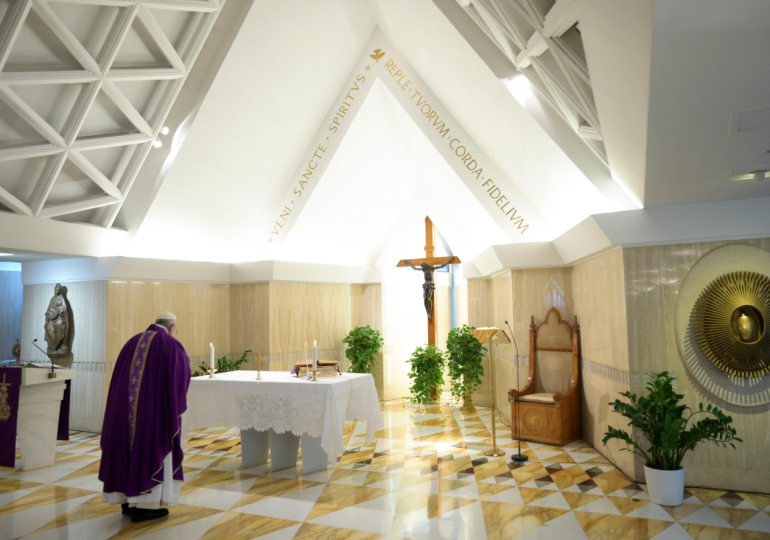While the world is watching, Pope Francis chooses to lead by example

Governing the Church is never easy. It is particularly difficult when everyone looks to Rome and to the Pope as a guide he is not necessarily able to give. What the Pontiff can offer is leadership, and on this point he seems to choose to lead by example.
There will be plenty of time for a critical examination of the decisions he made during this crisis and for continuing to monitor his official conduct more generally.
For now, it is difficult not to be struck by the balancing act he is carrying out between his role as "parish priest of the world" and that of the supreme governor of the Church. If the former was once a cloak he had chosen for himself, circumstances made it difficult for him to put it aside. The latter comes with the large chair.
When it comes to the government's spirited cunning in this crisis, Pope Francis has acted through his Curia. One of these acts was carried out by the apostolic penitentiary (not a prison, despite its name), which issued a decree establishing indulgences for the faithful affected by the coronavirus. Another was taken from the Congregation for Divine Worship and the Discipline of the Sacraments (CDW), which issued a decree establishing the above guidelines for bishops and priests during Holy Week and Easter celebrations.
In an interview with Vatican News, the major penitentiary, Cardinal Mauro Piacenza, explained that plenary indulgence was offered to all people suffering from coronavirus - those in hospital and those placed in quarantine at home, as well as operators healthcare, family members and caregivers. An indulgence is also offered to all those who pray for an end to the pandemic, or pray for those who have succumbed to the disease. Plenary indulgence is also available to people close to death, provided they are properly disposed and have regularly recited some prayers during their lifetime.
"The decree [of indulgence]", said Cardinal Piacenza, "offers extraordinary measures because of the general emergency we are experiencing".
When it comes to the CDW decree relating to Holy Week and Easter, the bases are that the bishops can postpone the traditional Chrism Mass, but the Triduum cannot be moved. The washing of the feet in the Lord's Supper Mass - always optional - will be omitted everywhere this year.
There have been some complaints about the way the CDW announcement was made. "However, today we hear this document from Cardinal Sarah," commented Massimo Faggioli, "this is a question that CANNOT [his emphasis] announce by decree in this bureaucratic way".
The criticism has been mitigated, if not veiled, by being leveled with the prefect of the CDW. However, it was the Pope's act. One is in harmony with Faggioli's complaint, but the acts of governance will be bureaucratic. It is the nature of the beast.
The announcement of the CDW was really curious, not so much for its contents or the way it was written, but for how it was published: on social media, through Cardinal Sarah's official Twitter account. One wonders why the prefect cardinal avoided the usual channels, but these are not usual times. In any case, the message came out there and here we are.
Along the way to where we are, several aspects of papal leadership have been exposed - distinct but not separate from his acts of government. Pope Francis prayed.
We remember the discreet impudence of Robert Bolt's St Thomas More, who spared with Cardinal Wolsey in A Man for All Seasons: “Would you like it, right? Rule the country with prayers? "
Other: "Yes, I should".
Wolsey: "I'd like to be there when you try."
Then, later in the same exchange, Wolsey again: “Other! You should have been a cleric! "
St. Thomas: "Like you, your grace?"
At the daily Mass in the chapel of the Domus Sanctae Marthae, Pope Francis offered several prayers: for the sick and for the dead; for healthcare professionals; for first responders, police and civil protection officers; for public authorities; for those whose livelihoods are threatened by disruption of trade and industry.
On Sunday, the Pope called the Christian leaders of the world and all the faithful to join him in reciting the Lord's prayer on the feast of the Annunciation (last Wednesday) and invited the faithful of the world to join him spiritually in an extraordinary urbi di benediction et orbi - of the city and of the world - today (27 March).
Theologians will continue to discuss whether there is a munus, a triple or triple power or three munera - teaching, sanctifying, governing - proper to the office. Where the tire meets the road, it is often difficult to distinguish perfectly from each other. Fortunately, such subtle distinctions are usually not necessary.
The week that ended on March 21st began with a big gesture: Pope Francis' pilgrimage through the streets of Rome the previous Sunday. It was not, in its own terms, an act of governance. It was a stimulating act, crackling accident and pregnant with symbolic meaning. It captured the tone and moment of the trial in which the city was - and continues to be - involved.